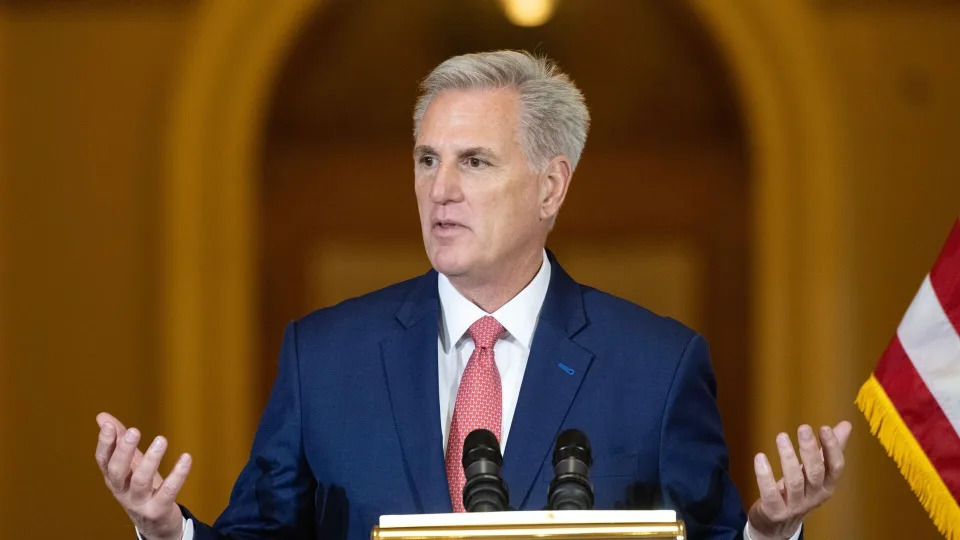AUSTERITY FOR THEE NOT MEMajor Cuts to Social Security Are Back on the Table — What’s Being Proposed Now?
Vance Cariaga
Sun, July 16, 2023

Shutterstock / Shutterstock
A group of Republican lawmakers aims to balance the federal budget and slash government spending by targeting programs like Social Security — and some seniors could see a major reduction in lifetime benefits if the plan makes it into law.
I’m a Social Security Expert: Here’s What Your Benefit Should Be in 5 Years
Find: 3 Ways To Recession-Proof Your Retirement
The proposal was unveiled June 14 by U.S. House conservatives, Bloomberg reported. One of its main features is to raise the full retirement age (FRA) at which seniors are entitled to the full benefits they are due.
The 176-member House Republican Study Committee (RSC) approved a fiscal blueprint that would gradually increase the FRA to 69 years old for seniors who turn 62 in 2033. The current full retirement age is 66 or 67, depending on your birth year. For all Americans born in 1960 or later, the FRA is 67.
As Bloomberg noted, workers expecting an earlier retirement benefit will see lifetime payouts reduced if the full retirement age is raised. Those payouts could be drastically reduced for seniors who claim benefits at age 62, when you are first eligible.
Lawmakers on both sides of the political aisle have been working to come up with a fix for Social Security before the program’s Old Age and Survivors Insurance (OASI) Trust Fund runs out of money. That could happen within the next decade or so. When it does, Social Security will be solely reliant on payroll taxes for funding — and those taxes only cover about 77% of current benefits.
While most Democrats want to boost Social Security through higher payroll taxes or reductions to benefits for wealthy Americans, the GOP has largely focused on paring down or privatizing the program.
As previously reported by GOBankingRates, House Speaker Kevin McCarthy (R-Calif.) recently told Fox News that this month’s debt limit bill was only “the first step” in a broader Republican agenda that includes further cuts.
“This isn’t the end,” McCarthy said. “This doesn’t solve all the problems. We only got to look at 11% of the budget to find these cuts. We have to look at the entire budget. … The majority driver of the budget is mandatory spending. It’s Medicare, Social Security, interest on the debt.”
As Bloomberg noted, Republicans argue that failing to change Social Security could lead to a 23% benefit cut once the trust fund is depleted. Raising the retirement age is a way to soften the immediate impact. The RSC said its proposal would balance the federal budget in seven years by cutting some $16 trillion in spending and $5 trillion in taxes.
“The RSC budget would implement common-sense policies to prevent the impending debt disaster, tame inflation, grow the economy, protect our national security, and defund [President Joe] Biden’s woke priorities,” U.S. Rep. Ben Cline (R-Va.), chairman of the group’s Budget and Spending Task Force, told Roll Call.
Democrats were quick to push back against the proposal.
“Budget Committee Democrats will make sure every American family knows that House Republicans want to force Americans to work longer for less, raise families’ costs, weaken our nation, and shrink our economy — all while wasting billions of dollars on more favors to special interests and handouts to the ultra-wealthy,” U.S. Rep. Brendan Boyle, (D-Pa.), the Budget Committee’s top Democrat, said in a statement.
Meanwhile, White House Press Secretary Karine Jean-Pierre issued a statement saying the RSC budget “amounts to a devastating attack on Medicare, Social Security, and Americans’ access to health coverage and prescription drugs.”
Although the proposal might make it through the GOP-led House, it’s unlikely to become law – at least while Biden is still president. Even if a bill somehow got approved by the Democrat-controlled Senate, Biden would almost certainly veto it.















